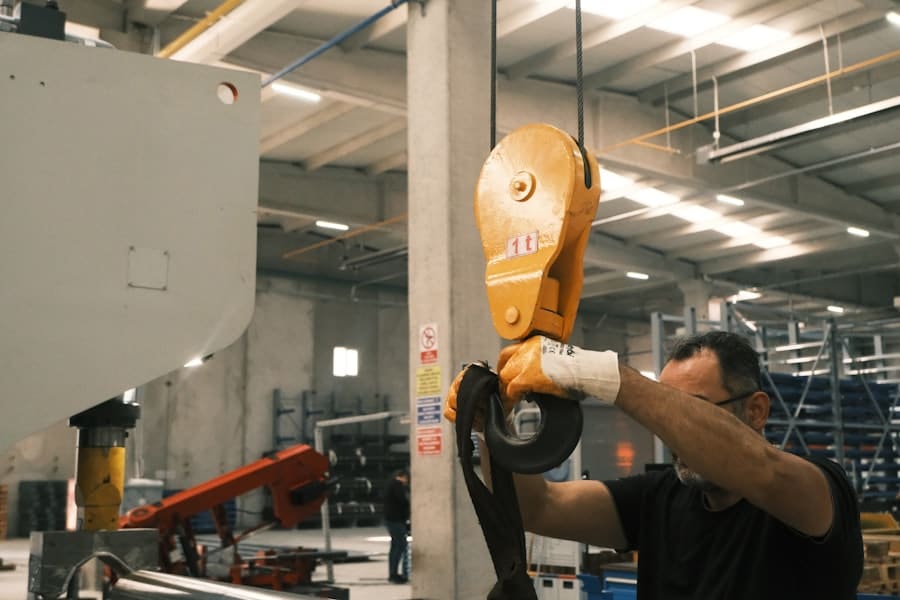As you navigate the complexities of modern logistics, you may find yourself increasingly aware of the transformative role that artificial intelligence (AI) plays in this sector. The logistics industry, characterized by its intricate networks and the need for efficiency, is ripe for innovation. AI technologies are not just buzzwords; they represent a paradigm shift in how goods are transported, stored, and delivered.
By harnessing the power of AI, logistics companies can streamline operations, reduce costs, and enhance customer satisfaction. In recent years, the integration of AI into logistics has accelerated, driven by advancements in machine learning, data analytics, and automation. You might be surprised to learn that AI can analyze vast amounts of data in real-time, enabling companies to make informed decisions quickly.
This capability is particularly crucial in an industry where timing and accuracy are paramount. As you delve deeper into the world of AI in logistics, you will discover how these technologies are reshaping traditional practices and paving the way for a more efficient future.
Key Takeaways
- AI is revolutionizing the logistics industry by streamlining processes and improving efficiency.
- Implementing AI in logistics can lead to benefits such as cost reduction, improved accuracy, and enhanced customer satisfaction.
- AI can enhance supply chain management by providing real-time visibility, predictive analytics, and demand forecasting.
- Improving inventory management using AI can result in better demand forecasting, reduced stockouts, and optimized inventory levels.
- Optimizing route planning and delivery with AI can lead to reduced transportation costs, improved on-time delivery, and better resource utilization.
The Benefits of Implementing AI in Logistics
When you consider the benefits of implementing AI in logistics, the advantages become immediately apparent. One of the most significant benefits is the enhancement of operational efficiency. By automating routine tasks and optimizing processes, AI allows logistics companies to allocate resources more effectively.
For instance, AI-driven systems can analyze shipping routes and delivery schedules to minimize delays and reduce fuel consumption. This not only saves money but also contributes to a more sustainable approach to logistics. Moreover, AI can significantly improve decision-making processes within logistics operations.
With access to real-time data and predictive analytics, you can make informed choices that enhance service delivery. For example, AI can forecast demand patterns based on historical data, allowing you to adjust inventory levels accordingly. This proactive approach minimizes stockouts and overstock situations, ultimately leading to improved customer satisfaction and loyalty.
Enhancing Supply Chain Management with AI

As you explore the role of AI in supply chain management, you’ll find that it serves as a powerful tool for enhancing visibility and collaboration across the entire supply chain. AI technologies can analyze data from various sources, providing you with a comprehensive view of your supply chain’s performance. This visibility enables you to identify bottlenecks and inefficiencies that may be hindering your operations.
Furthermore, AI facilitates better collaboration among stakeholders in the supply chain. By leveraging machine learning algorithms, you can share insights and forecasts with suppliers and partners, fostering a more integrated approach to supply chain management. This collaboration not only improves communication but also enhances responsiveness to market changes.
As a result, you can adapt more quickly to fluctuations in demand or disruptions in supply, ensuring that your logistics operations remain agile and competitive.
Improving Inventory Management using AI
Inventory management is a critical aspect of logistics that can greatly benefit from AI implementation. You may already know that maintaining optimal inventory levels is essential for minimizing costs while meeting customer demands. AI can help you achieve this balance by providing advanced forecasting capabilities that take into account various factors such as seasonality, market trends, and consumer behavior.
With AI-driven inventory management systems, you can automate replenishment processes and optimize stock levels in real-time. These systems analyze sales data and predict future demand, allowing you to adjust your inventory accordingly. This not only reduces the risk of stockouts but also minimizes excess inventory that ties up capital.
By leveraging AI for inventory management, you can enhance your operational efficiency and improve your bottom line.
Optimizing Route Planning and Delivery with AI
Route planning is another area where AI can make a significant impact on logistics operations. As you know, efficient route planning is crucial for timely deliveries and cost-effective transportation. AI algorithms can analyze traffic patterns, weather conditions, and other variables to determine the most efficient routes for your deliveries.
This capability allows you to reduce transit times and fuel consumption while improving overall service quality. Additionally, AI can help you adapt to real-time changes in delivery conditions. For instance, if an unexpected road closure occurs or traffic congestion arises, AI systems can quickly recalibrate routes to ensure that deliveries remain on schedule.
This level of adaptability not only enhances customer satisfaction but also strengthens your reputation as a reliable logistics provider. By optimizing route planning with AI, you can achieve greater efficiency and responsiveness in your delivery operations.
Utilizing AI for Predictive Maintenance in Logistics

Predictive maintenance is an area where AI can significantly enhance the reliability of logistics operations. As you manage fleets of vehicles or equipment, unexpected breakdowns can lead to costly delays and disruptions. By leveraging AI technologies, you can implement predictive maintenance strategies that anticipate equipment failures before they occur.
AI systems analyze data from sensors embedded in vehicles or machinery to monitor their performance continuously. By identifying patterns and anomalies in this data, you can predict when maintenance is needed and schedule it proactively. This approach minimizes downtime and extends the lifespan of your assets, ultimately leading to cost savings and improved operational efficiency.
As you embrace predictive maintenance powered by AI, you’ll find that your logistics operations become more resilient and reliable.
Overcoming Challenges and Risks of AI Implementation in Logistics
While the benefits of AI in logistics are substantial, it’s essential to acknowledge the challenges and risks associated with its implementation. As you consider integrating AI into your operations, you may encounter obstacles such as data quality issues or resistance from employees who fear job displacement due to automation. Addressing these challenges requires a strategic approach that emphasizes training and change management.
To successfully implement AI solutions, you must ensure that your data is accurate and reliable. Poor-quality data can lead to flawed insights and decision-making processes. Investing in data cleansing and management practices will be crucial as you embark on your AI journey.
Additionally, fostering a culture of innovation within your organization will help alleviate concerns among employees about job security. By emphasizing how AI can augment human capabilities rather than replace them, you can create a more supportive environment for technological adoption.
Future Trends and Opportunities for AI in Logistics
Looking ahead, the future of AI in logistics is filled with exciting trends and opportunities that you should be aware of as you plan for the next phase of your operations. One notable trend is the increasing use of autonomous vehicles for transportation and delivery purposes. As technology continues to advance, self-driving trucks and drones are becoming more viable options for logistics companies seeking to enhance efficiency and reduce labor costs.
Another opportunity lies in the integration of AI with other emerging technologies such as blockchain and the Internet of Things (IoT). By combining these technologies, you can create a more transparent and secure supply chain ecosystem that enhances traceability and accountability. As you explore these future trends, you’ll find that embracing innovation will be key to staying competitive in an ever-evolving logistics landscape.
In conclusion, as you navigate the complexities of logistics in today’s fast-paced environment, embracing artificial intelligence offers numerous benefits that can transform your operations. From enhancing supply chain management to optimizing route planning and improving inventory management, AI has the potential to revolutionize how you conduct business. While challenges exist, addressing them strategically will position you for success as you harness the power of AI in logistics now and into the future.
Streamlining operations with AI in logistics is crucial for optimizing efficiency and reducing costs in the supply chain industry. However, AI is not only transforming logistics but also making a significant impact in various other fields. One related article worth exploring is AI in Sports Analytics: Enhancing Performance and Strategy. This article delves into how AI is revolutionizing the world of sports by providing valuable insights and strategies to enhance performance and gain a competitive edge. Just like in logistics, AI is being used to analyze data, predict outcomes, and optimize decision-making processes in the sports industry.
FAQs
What is AI in logistics?
AI in logistics refers to the use of artificial intelligence technologies such as machine learning, predictive analytics, and natural language processing to optimize and automate various processes within the logistics and supply chain industry.
How does AI streamline operations in logistics?
AI streamlines operations in logistics by automating repetitive tasks, optimizing route planning and scheduling, predicting demand and inventory levels, and improving overall efficiency and accuracy in various aspects of the supply chain.
What are the benefits of using AI in logistics?
Some benefits of using AI in logistics include improved operational efficiency, reduced costs, enhanced decision-making through data analysis, better inventory management, and the ability to adapt to changing market conditions and customer demands.
What are some examples of AI applications in logistics?
Examples of AI applications in logistics include autonomous vehicles for transportation, predictive maintenance for equipment, demand forecasting for inventory management, and chatbots for customer service and support.
What are the challenges of implementing AI in logistics?
Challenges of implementing AI in logistics include the initial investment in technology and infrastructure, data privacy and security concerns, the need for skilled personnel to manage and interpret AI systems, and the potential for disruption to existing processes and workflows.






